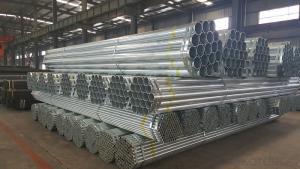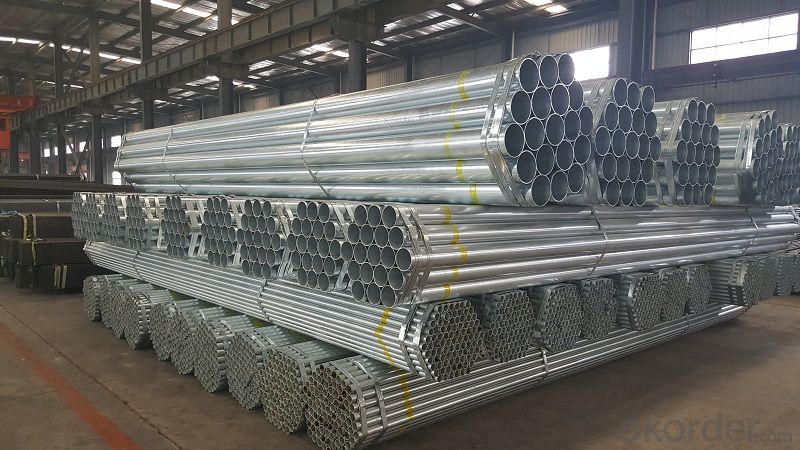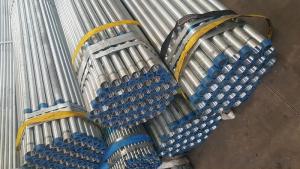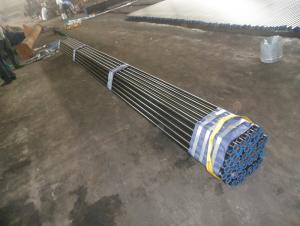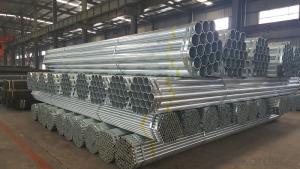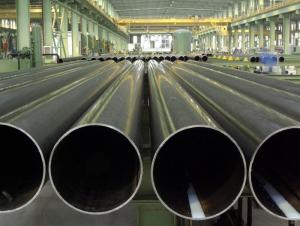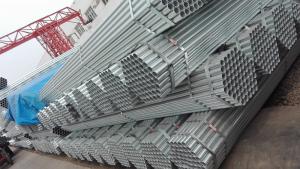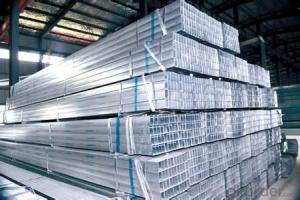Galvanized welded round tube and rectangular tube
- Loading Port:
- Tianjin
- Payment Terms:
- TT OR LC
- Min Order Qty:
- 10 m.t.
- Supply Capability:
- 10000 m.t./month
OKorder Service Pledge
OKorder Financial Service
You Might Also Like
Specification
1、Structure of Galvanized welded round tube and rectangular tube:
The surface of galvanized steel pipe welded steel pipe of hot dip galvanized layer or. Galvanized can increase the corrosion resistance of the steel tube, prolong service life. Galvanized pipe is widely used, in addition to water, gas, oil and other general low pressure fluid pipelines. It is also used in the petroleum industry, especially for offshore oil field of oil well pipe and oil pipe, chemical, coking equipment of oil heater, condensation cooler, coal run oil exchanger tube, and trestle pile, the mine tunnel support frame tube.
2、Main Features of Galvanized welded round tube and rectangular tube:
• High manufacturing accuracy
• High strength
• Good visual effect
• Reasonable price
3、 Galvanized welded round tube and rectangular tube Specification:
Standard | GB, DIN, ASTM ASTM A106-2006, ASTM A53-2007 |
Grade | 10#-45#, 16Mn 10#, 20#, 45#, 16Mn |
Thickness | 1 - 33 mm |
Section Shape | Round |
Outer Diameter | 21 - 610mm |
Place of Origin | Tianjin, China (Mainland) |
Secondary Or Not | Non-secondary |
Application | Hydraulic Pipe |
Technique | Cold Drawn |
Certification | API |
Surface Treatment | factory state or painted black |
Special Pipe | API Pipe |
Alloy Or Not | Non-alloy |
Length | 5-12M |
Outer Diameter | 21.3-610mm |
Grade | 20#, 45#, Q345, API J55, API K55, API L80, API N80, API P110, A53B |
Standard | ASME, ASTM |
1) Material:Q195 Q235 Q345 X42 X52
2) Specification range:OD:21.3-610mm,WT:6-70mm,length:6-12m or according to the requirement of clients.
3) Excutive standards:GB,ASME API5L.ASTM A 106/A53,Despite of the above standards,we can also supply seamless steel pipe with standard of DIN,JIS,and so on,and also develop new products according to the requirements of our clients!
4) Surface: galvanized.
5) Ends:Beveled or square cut,plastic capped,painted.
6) Packing:bundles wrapped with strong steel strip,seaworthy packing.
4、Packaging & Delivery
Packaging Details: | seaworthy package,bundles wrapped with strong steel strip |
Delivery Detail: | 15-30days after received 30%TT |
5、FAQ of Galvanized welded round tube and rectangular tube:
①How is the quality of your products?
Our products are manufactured strictly according to national and internaional standard, and we take a test
on every pipe before delivered out. If you want see our quality certifications and all kinds of testing report, please just ask us for it.
Guaranteed: If products’ quality don’t accord to discription as we give or the promise before you place order, we promise 100% refund.
②How about price?
Yes, we are factory and be able to give you lowest price below market one, and we have a policy that “ for saving time and absolutely honest business attitude, we quote as lowest as possible for any customer, and discount can be given according to quantity”,if you like bargain and factory price is not low enough as you think, just don’t waste your time.Please trust the quotation we would give you, it is professional one.
③Why should you chose us?
Chose happens because of quality, then price, We can give you both.Additionally, we can also offer professional products inquiry, products knowledge train(for agents), smooth goods delivery, exellent customer solution proposals.Our service formula: good quality+good price+good service=customer’s trust
SGS test is available, customer inspection before shipping is welcome, third party inspection is no problem.
6、 Galvanized welded round tube and square rectangular tube Images:
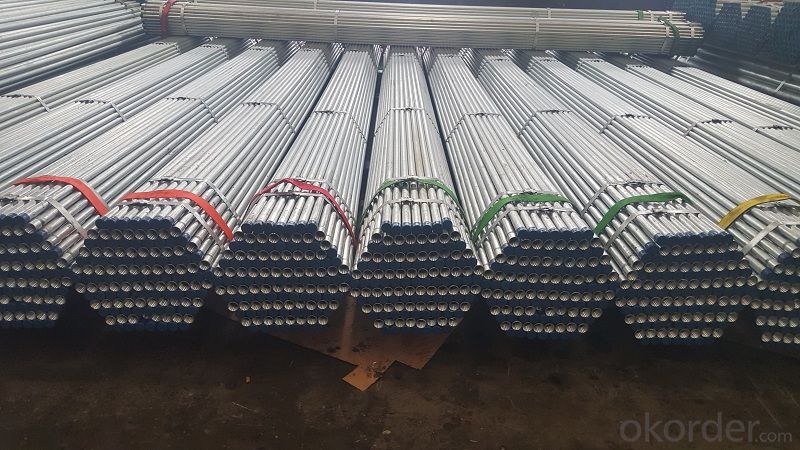
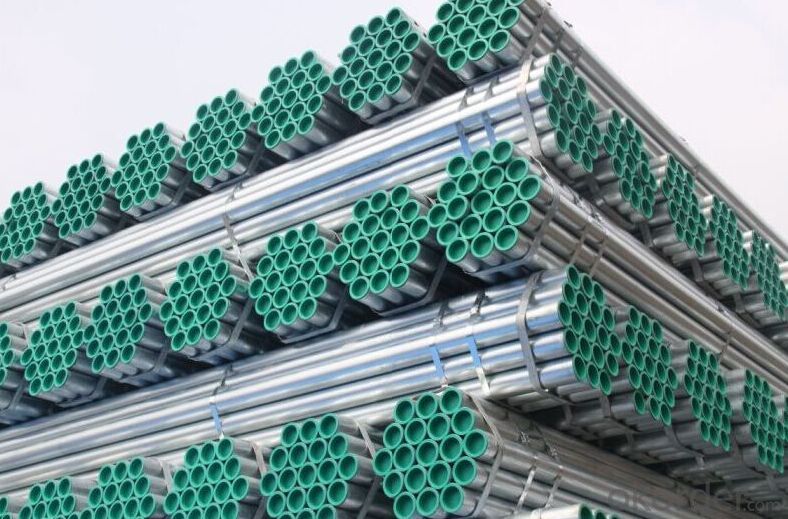
- Q: How are steel pipes used in the construction of offshore platforms?
- Steel pipes are used in the construction of offshore platforms primarily for their strength and durability. These pipes serve various purposes such as transporting fluids, providing structural support, and enabling the installation of essential equipment. They are commonly used for the fabrication of underwater pipelines, risers, and conductor casings, ensuring efficient and reliable operations in harsh marine environments.
- Q: Can steel pipes be used for structural applications?
- Yes, steel pipes can be used for structural applications. Steel pipes have high strength, durability, and resistance to various environmental conditions, making them suitable for structural purposes. They are commonly used in the construction industry for the fabrication of buildings, bridges, and other structures. Steel pipes have excellent load-bearing capacity and can withstand heavy loads, making them ideal for supporting structures and transferring loads. Additionally, steel pipes can be easily fabricated, welded, and connected, allowing for efficient construction. Overall, steel pipes are a reliable and cost-effective option for structural applications.
- Q: How are steel pipes protected during transportation and storage?
- Steel pipes are typically protected during transportation and storage through various measures such as corrosion prevention coatings, wrapping them with protective materials like plastic or rubber, and securing them properly to prevent any damage or movement.
- Q: How are steel pipes used in the construction of high-rise buildings?
- Steel pipes are commonly used in the construction of high-rise buildings for various purposes. They are primarily used as structural elements, forming the framework and supporting the weight of the building. Steel pipes provide strength and durability, making them suitable for withstanding the vertical and lateral loads experienced by tall buildings. Additionally, steel pipes are used for plumbing and electrical systems, as well as for heating, ventilation, and air conditioning (HVAC) installations. Their versatility, reliability, and ease of installation make steel pipes an essential component in the construction of high-rise buildings.
- Q: Are steel pipes suitable for HVAC systems?
- Yes, steel pipes are suitable for HVAC systems. Steel pipes have several advantages that make them a popular choice for HVAC applications. First, steel pipes are strong and durable, allowing them to withstand high pressure and temperature requirements commonly found in HVAC systems. Additionally, steel pipes have excellent corrosion resistance, making them suitable for both indoor and outdoor installations. Steel pipes also have a long lifespan, reducing the need for frequent replacements or repairs. Moreover, steel pipes are readily available in various sizes and thicknesses, allowing for easy customization and installation. Lastly, steel pipes are cost-effective, providing a cost-efficient solution for HVAC systems compared to other materials. Overall, steel pipes are a reliable and suitable choice for HVAC systems due to their strength, durability, corrosion resistance, availability, and cost-effectiveness.
- Q: Can steel pipes be used for conveying slurry?
- Yes, steel pipes can be used for conveying slurry. Steel pipes are commonly used in industries such as mining, dredging, and wastewater treatment, where slurry - a mixture of solid particles and liquid - needs to be transported. Steel pipes offer high strength, durability, and resistance to abrasion, making them suitable for handling the abrasive nature of slurry. Additionally, steel pipes can be lined or coated with materials such as rubber or ceramic to further enhance their resistance to wear and corrosion, making them a reliable choice for conveying slurry.
- Q: How are steel pipes used in heating systems?
- Steel pipes are commonly used in heating systems as they have excellent durability and heat resistance properties. These pipes are typically used to transport hot water or steam from a heating source, such as a boiler, to various parts of a building, including radiators or baseboard heaters. They are also used for circulating cooled water back to the heating source for reheating. The high strength and corrosion-resistant nature of steel pipes make them ideal for handling the high temperatures and pressures involved in heating systems, ensuring efficient heat transfer and long-lasting performance.
- Q: Can galvanized pipe be welded with seamless steel tube? What should I do to connect?
- Processing method is very simple, I suggest you add blue disk connection, you can not use welding ~ ~ ~!The gas pipe is the best galvanized pipe, mainly play a role in anti-corrosion ~ ~ ~ ~ if you must use seamless connection can.When welding, can open a certain groove, use galvanized material electrode, but the premise is must be welded with seamless tube firmly.
- Q: What are the different types of steel pipe supports for overhead piping?
- There are several types of steel pipe supports for overhead piping, including pipe hangers, pipe clamps, beam clamps, and pipe rollers. Pipe hangers are used to support vertical pipes, while pipe clamps provide support for horizontal pipes. Beam clamps are designed to attach to structural beams and provide support for the pipe. Pipe rollers are used to allow the pipe to move freely, accommodating expansion and contraction.
- Q: What are the environmental impacts of steel pipe manufacturing?
- The environmental impacts of steel pipe manufacturing include the extraction and mining of raw materials, such as iron ore and coal, which can lead to habitat destruction and pollution. The steel production process consumes significant amounts of energy and releases greenhouse gases, contributing to climate change. Additionally, the production of steel pipes involves the use of chemicals and toxic substances, which can contaminate water sources and harm ecosystems. Proper waste management and the adoption of sustainable practices can help mitigate these impacts.
Send your message to us
Galvanized welded round tube and rectangular tube
- Loading Port:
- Tianjin
- Payment Terms:
- TT OR LC
- Min Order Qty:
- 10 m.t.
- Supply Capability:
- 10000 m.t./month
OKorder Service Pledge
OKorder Financial Service
Similar products
Hot products
Hot Searches
Related keywords
